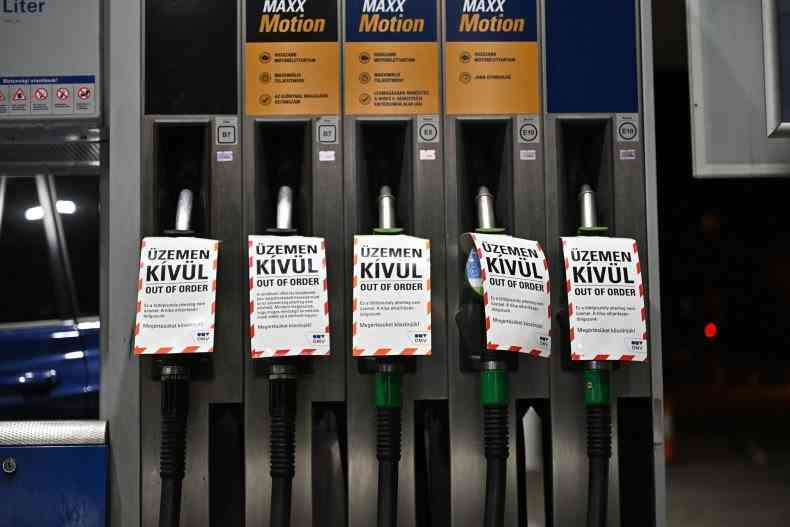- Opposition-led areas denied new utility subsidies accuse Vicktor Orban of pursuing “political revenge”
- No local government can survive without help amid economic crisis, one Orban rival says
- Government says opposition allegations “cannot be taken seriously”
Hungarian Prime Minister Viktor Orban swept to another term with a comfortable election victory in 2021, dashing liberal hopes that his ouster—always considered unlikely given the prime minister’s influence over Hungary’s media and judicial landscape—would pull a troublesome thorn from the European Union’s collective paw.
Orban—who has described former President Donald Trump as a “good friend”—has become a darling of America’s populist right, receiving a standing ovation at last summer’s Conservative Political Action Conference in Texas after declaring: “I’m here to tell you that we should unite our forces.”
The “West is at war with itself,” Orban told CPAC attendees, assuring them that a transatlantic ideological “battle for Western civilization” was unfolding. “The globalists can all go to hell,” Orban said to applause.
Orban’s “globalist” adversaries at home in Europe are upping the pressure. The prime minister is locked in a high-stakes standoff with the EU, last month even calling for the European Parliament to be abolished over its recent corruption scandal.
Getty
Budapest is now working to free up $23 billion in funds frozen by the EU over concerns related to judicial independence, academic freedom, the rights of LGBTQ people, and Hungary’s asylum system.
EU measures and the war in Ukraine are to blame for Hungary’s deepening economic problems, according to Orban and his top officials, with the inflation rate having soared to almost 25 percent; the highest in the EU.
Opposition figures say Orban is now trying to harness his conflict with Brussels to further erode democracy and silence his opponents, an allegation the prime minister’s office denies.
Leading opposition politicians are calling on the EU to investigate what they say is the weaponization of utility subsidies worth some 44 billion Hungarian Forints (around $120 million), introduced this month to support municipal governments representing populations of more than 10,000.
Among the handful of municipalities denied government funding was the 44,000-person city of Hodmezovasarhely, whose Mayor Peter Marki-Zay stood against Orban and his Fidesz party as the coalition opposition candidate in last year’s election.
Marki-Zay founded the Everybody’s Hungary Movement in 2018, and won the collective opposition primary to challenge Orban under the banner of the United for Hungary coalition.
Hodmezovasarhely, Marki-Zay told Newsweek, was the only of Hungary’s 25 cities with “county rights”—an administrative subdivision for cities that are, or were, county seats—not to receive the utility subsidies. Six opposition-led municipalities in the capital Budapest—traditionally a bastion of anti-Fidesz organizing—also did not receive any funds.
“We are the only ones who didn’t receive any subsidy,” Marki-Zay said of the county-rights cities. “And we are the third poorest of the 25. So there’s absolutely no reason why this shouldn’t have been given a subsidy.”
Marki-Zay is demanding an explanation of the subsidy process and a review of the payouts.
He suggested that Janos Lazar, Orban’s Minister of Construction and Investment, had weaponized the government’s financial support. “He is a very prominent figure and he already promised several times in the last few months that we are not getting any subsidies…It’s very apparent that it was probably Lazar’s lobbying and the government’s decision based on political stance.”
A group of mayors representing the Democratic Coalition (DK) are already taking legal action against Orban’s government. The leaders requested to meet with government representatives to discuss subsidies as a group but were refused, so the meetings never took place. The party has accused Orban of pursuing “political revenge” and claimed its mayors were “wrongfully denied the opportunity to negotiate.”
Those refused funding are also frustrated by what they said was intentional opacity of the subsidy decisions, which the government said would be based on factors including the wealth of areas and their tax base.
Energy Wars
Orban’s office told Newsweek that the allegation of weaponizing subsidies “is not true,” and that the money was assigned “regardless of party affiliation.” Ten opposition-led districts were among the recipients, the office said.
Only those municipalities “whose leaders refused to attend the relevant consultations and chose to not request assistance,” were excluded, Orban’s office said. “These districts are either so well-off that they do not need any support, or do not want to provide assistance for the people living there.”
Accusations to the contrary, the office said, “cannot be taken seriously.”
Orban’s office said this first round of subsidies may be followed by more depending “on how the Hungarian economy develops in the course of the year and on how gas and crude oil prices change.”
“If a mayor does not sit down for an informal meeting with the government to discuss the extra costs stemming from the increase in utility bills, he does not need the state’s support. The vast majority of mayors somehow did consult with the government.”
Marki-Zay disputed the reasoning given by Orban’s office, noting that he attended a meeting with government representatives on October 24 where a wide range of funding issues were discussed, including support for a swimming pool that never materialized. Orban’s office did not respond to Newsweek‘s request for confirmation of the October meeting in time for publication.
Marki-Zay said Hodmezovasarhely is now facing a precarious financial situation, needing to service “huge debts” left by his predecessors while interest rates in Hungary have risen above 10 percent. The city faces €1.5 million in additional interest rate costs alone, Marki-Zay said.

ATTILA KISBENEDEK/AFP via Getty Images
“Hardly any municipality in Hungary could survive without government help,” the mayor said, dismissing the government’s suggestion that his area does not need the subsidies.
Agnes Kunhalmi is the co-president of the Hungarian Socialist Party (MSZP) and the representative of Budapest’s 15th constituency. The area is part of the city’s 18th municipality, which was denied funding after Mayor Sandor Szaniszlo and his DK colleagues refused to meet with the government unless allowed to do so as a group.
“Fidesz has been discriminating against opposition-led local governments since the COVID epidemic broke out in 2020, and has radically cut their resources on this basis,” Kunhalmi told Newsweek.
“The war and the energy crisis have exacerbated the financial difficulties of local governments. Fidesz-led cities have been compensated by the government with individual decisions, while opposition-led cities have received nothing. The financial situation of opposition-led Budapest, which has been hit hardest by government cutbacks, is particularly dire.”
The refusal of the government to meet with the DK mayors—and therefore their exclusion from the subsidies—”is discriminatory,” said Kunhalmi, who also accused the DK of being “more concerned with proving its opposition to Fidesz than with representing the people of their districts.”
Andras Jambor—a member of the Spark Movement leftist party who won the contest to represent Budapest’s 6th constituency under the United for Hungary banner in the 2021 election—told Newsweek that those seeking government consultations in the fall were given “minimal time” to do so.
He spoke of mayors who had tried and failed to reschedule appointments with government representatives, as well as those denied group meetings. “This cannot be called a normal negotiation process,” Jambor said.
“Essentially, the government retrospectively created basic requirements that laid the grounds for them to sift through the to-be-supported local governments for political purposes. Looking at the numbers, we can see that this is indeed what happened.”
Jambor’s constituency straddles two Budapest municipalities, one of which—the 9th district headed by independent Mayor Krisztina Baranyi—was denied subsidies. Baranyi wrote on Facebook: “Like so many other things, the fate of this public money in Hungary is decided on the basis of an unknown system of criteria.”
Jambor said: “The lack of subsidies will not directly affect the citizens, since local governments will compensate for the lost subsidy from their own resources. But the local government sector, which has been continuously drained in recent years, is still on the verge of bankruptcy in many settlements.”
Expanding Orban Control
Peter Kreko, a Hungarian political scientist and the director of the Political Capital institute, told Newsweek there is a “pretty clear” approach by Orban’s government to weakening the opposition.
“There is a general strategy, we can say, in which the government claims that it is highly supportive towards opposition municipalities and at the same time—especially when it comes to Budapest, but to other opposition municipalities as well—makes their lives extremely difficult,” Kreko said.
Municipal elections will be held in 2024. Kreko said the vote could prove “a decisive moment, and the game that the government is trying to play is to show that the opposition municipalities are highly incompetent.”
Zsuzsanna Szelenyi, a former member of Hungary’s parliament and the author of “Tainted Democracy, Viktor Orbán and the Subversion of Hungary,” told Newsweek the utility subsidies issue is part of a bigger picture.
“There is an entire reconstruction of the Hungarian business structure which started in 2010 led by the government, which aims for a certain circle of businesspeople to become the major owners of strategic industries in Hungary,” Szelenyi said.
“It’s an essential element of Orban’s regime that they want to restructure Hungarian wealth,” she said. “It’s a public aim of this government, it’s not even a secret. Of course, the way it’s done is often very opaque.”

Janos Kummer/Getty Images
“Orban announced several years ago that he wants more things in Hungarian hands, so there were lots of special taxes in earlier years which basically pushed a lot of foreign owners out of this country. The government bought a lot of media outlets, energy trade companies, public service companies; huge industries.”
“And then, later, this state ownership actually goes into private hands with the support of the Hungarian government or Hungarian bank loans…These Hungarian owners are actually close to the leading party.”
Government support for municipality-level energy service providers, Szelenyi said, could prove the latest government grab of local wealth producers. “The government wants to buy the service companies by offering some support…we don’t know how, in one or two or three years, these companies will actually end up.”
And if service providers in unsupported municipalities fail, Szelenyi said the government could step in and take control of local energy networks.
Responsibility for many public services, Szelenyi said, has been transferred from municipalities to the central government as Orban looks to entrench control.
One such service is education. The government has recently faced large and sustained protests from from striking teachers, demanding better pay and working conditions. Activists have accused the government of intentionally underfunding and over-centralizing the education system.
“They’re hollowing out the competencies of the municipalities because municipalities are independent and autonomous structures within the Hungarian state,” Szelenyi said.
“This type of government, this autocratic type of government, that Orban is building wants to control everything.”
This centralization of power and securing of strategic industries by allies bears hallmarks of the state capitalism that entrenched President Vladimir Putin’s fearsome power in Russia. “There are a lot of similarities,” Szelenyi said.
A Job for the EU?
A spokesperson for the European Commission—which is overseeing Hungary’s efforts to unlock its $23 billion in frozen funds—declined to comment on the accusations of Hungary’s opposition.
Marki-Zay said the subsidy furore should influence the Commission’s analysis. “Payments are still dependent on the Hungarian government’s behavior,” he said. “That’s why it’s important that we talk about it on the international scene, that they are still not following rule of law requirements.”
Kunhalmi said the issue “clearly deserves the Commission’s attention, as this clearly shows how Fidesz is making it impossible for the local governments opposing it to operate. The basic aim of this government policy is to make it clear to the people who live there that they can only receive significant support if they vote for Fidesz in the next election.”

JOHN THYS/AFP via Getty Images
“In a parliamentary system like Hungary, it is not the parliamentary majority that controls the government. It is the opposition. The parliamentary majority ensures the stability of the government. It is no accident that Fidesz has been curtailing the rights of the opposition since 2010.”
“Based on the experience of the past 12 years, the government cannot be expected to maintain neutrality,” Jambor said, calling on the EU to ensure that future funds go directly to local authorities.
But intentional exclusion of opposition areas will be hard to prove, especially in relation to the DK-run municipalities whose mayors never met with government representatives about the subsidies.
“It would be very difficult to find a smoking gun on this uneven financing,” Kreko said, adding that the Commission may consider the matter an internal budgetary matter than anything to do with the EU.
Preferential funding to government-controlled areas is not uncommon, even in more robust and long-standing democracies. “They shouldn’t be naive, if it exists to a certain extent everywhere,” Kreko said. “Why would we expect that it does not exist in Hungary, in a country where there is a lower level of rule of law and political accountability?”
“These distortions are just more explicit than in countries where you have higher standards of democratic accountability.”
Szelenyi also noted that the EU “typically keeps distance from openly political issues.” But, she added, “I think the political struggle or exercise of power is often happening in a discriminatory way in Hungary, and this is what the EU should watch.”
“It is changing power structures because it’s weakening local municipalities and strengthening the state. This is part of the building of the autocratic state in Hungary. Wherever there is a clear different treatment of different municipalities, that is definitely an issue the EU should look at.”
